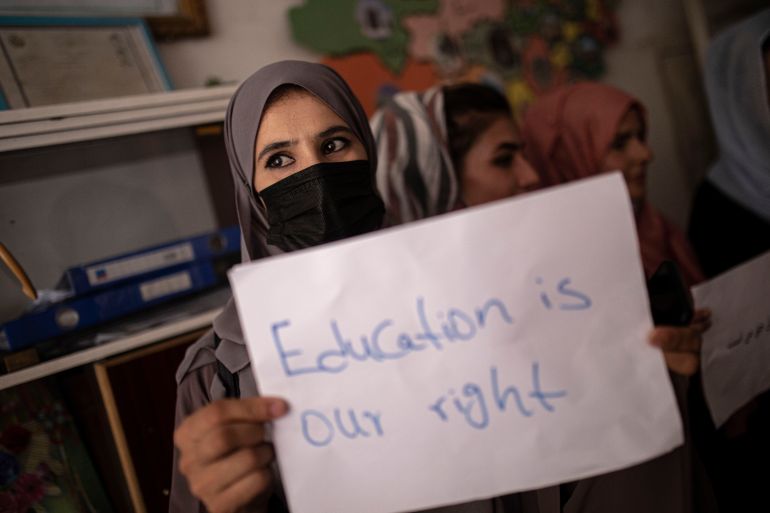UNSC calls for reversal of Taliban policies on women, girls
The United Nations Security Council expressed ‘deep concern’ over the Taliban order forcing women to cover their faces in public, including on television broadcasts.

The United Nations Security Council called on the Taliban to “swiftly reverse” policies restricting human rights and freedoms for Afghan women, in a unanimously adopted statement amid fears the Taliban was setting the clock back on women’s rights.
The move on Tuesday comes just days after female TV presenters were ordered to cover up fully, including their faces, the latest in a slew of Taliban restrictions on civil society, many of which are focused on women and girls.
Keep reading
list of 3 itemsAfghanistan healthcare ‘on brink of collapse’ amid Omicron scare
‘No need’: Taliban dissolves Afghanistan election commission
In the text drafted by Norway, the council’s 15 member states said they were particularly concerned with the Taliban’s “imposition of restrictions that limit access to education, employment, freedom of movement, and women’s full, equal and meaningful participation in public life”.
The council said it called on the Taliban “to swiftly reverse the policies and practices which are currently restricting the human rights and fundamental freedoms of Afghan women and girls.”
It demanded the Taliban re-open schools for all female students without further delay and expressed “deep concern” over the announcement that women must cover their faces in public, including on television broadcasts.
The Taliban had promised media freedom and women’s rights upon their return to power but instead, they have gradually expanded curbs, particularly on women, with high schools for girls yet to open more than eight months since their takeover.
According to diplomats, negotiations on the text, which lasted nearly two weeks, hit road bumps when China and Russia objected to a focus on human rights.
Consequently, the document also includes paragraphs expressing “deep concern regarding the volatile situation in Afghanistan” in terms of humanitarian, political, economic, social and security issues.
In particular, the text cites drug trafficking and “terrorist” attacks targeting civilians, in addition to the need to restore the country’s financial and banking systems.
During the Taliban’s last time in power in Afghanistan from 1996 to 2001, they imposed overwhelming restrictions on women, requiring them to wear the all-encompassing burqa or full body veil and barring them from public life and education.
After they seized power again in August, the Taliban initially appeared to have moderated somewhat their restrictions, announcing no dress code for women. But in recent weeks, they have made a sharp, hardline pivot that has confirmed the worst fears of rights activists and further complicated the Taliban’s dealings with an already distrustful international community.
Earlier this month, the Taliban passed a decree making the wearing of face veils mandatory in public spaces. They have also banned women from travelling more than 72km (45 miles) without a mahram (male guardian), and have prevented girls from attending school after the sixth grade.
Human rights activists say the Taliban’s growing restrictions aim to remove women from public life and that it is clear they intend to enforce the latest decree on face coverings.
In March the Taliban also backtracked on their announcement that high schools would open for girls, saying they would remain closed until a plan was drawn up in accordance with Islamic law for them to reopen.
The UN Security Council “reiterated their call on the Taliban to adhere to their commitments to reopen schools for all female students without further delay.”